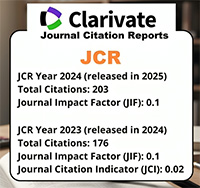The effect of montelukast in a model of gouty arthritis induced by sodium monourate crystals
Resumen
Non-steroidal anti-inflammatory drugs (NSAIDS) are the first line of therapy in acute gouty arthritis. NSAIDs inhibit the cyclooxygenase pathway, but not the lipooxygenase activity and can have many adverse effects and thus have a limited effect on the control of inflammation in this disease. In this work we studied the effect of montelukast on the cellular inflammatory infiltrate in a model of murine arthritis induced by sodium monourate crystals (SMU), using a subcutaneous air cavity (air pouch) in BALB/c mice. Seven groups of BALB/c mice (n = 4) were distributed into five experimental groups and two inflammatory control groups, a positive and a negative one. Previous to SMU exposure, the experimental groups received montelukast (1 and 0.01 mg/Kg/w) and/or indomethacine (2.5 mg/Kg/w), followed by administration of SMU in the air pouch. The total and differential counts of inflammatory cells were analyzed after 2, 6, 12 and 24 hours. Montelukast, significantly reduced the total number of cells (p<0.05), with a predominant impact on polymorphonuclear over mononuclear cells, especially after 12 hours of the medication. The montelukast/indometacine combination showed an additive effect. Our data show that montelukast has an anti-inflammatory effect in the model of gouty arthritis. Consequently, anti-leukotrienes could represent a new and effective therapy, either isolated or combined with conventional therapy of gouty arthritis.




















